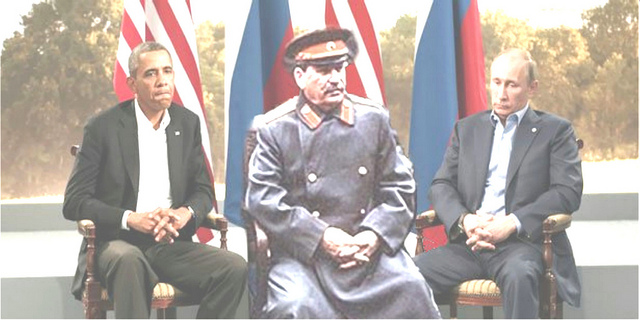
BY CAROLINE WRAY:
23 years have passed since the Soviet Union was toppled and the end of the Cold War seemed to finally have come. The West celebrated and breathed a sigh of relief as Eastern Europe spent years adjusting to non-Soviet rule (in many cases, trying to construct novel governments), reconfiguring very complicated cultural lines, and mending Western relationships. Russia has proceeded in a successful—and it takes only reading a current headline and witnessing the inability of nations such as Germany or the UK to pose any serious economic threat to Putin—campaign to become a major world player, and one that works alongside the West. In this time American and Russian presidents have shaken hands, fought terrorism, and been partners at the UN. AP History high school students answered with ease that the Cold War ended 23 years ago.
Yet now Cold War relations seem to be rising from the grave. German Chancellor Angela Merkel has claimed that Putin has “lost touch with reality,” and is “living in a different world.” Stop acting like a 19th century autocrat, US Secretary of State John Kerry says. This is crazy, the West says. This is out of the blue. We figured this out 23 years ago.
But did we really figure it out 23 years ago—is it really out of the blue?
Russian President Vladimir Putin’s pre-“Crimean reunification treaty” speech, received with multiple standing ovations, was emotional. He was angry on behalf of his nation: post-1991, he said, Russia had been weakened and hopelessly divided. Taking back Crimea is only a means of reunifying his divided people.
This is not a man who has buried the hatchet.

Well, tough, the West says. The Soviet empire toppled. Crimea is part of Ukraine. Ukraine wants to align itself more with Europe. Ukraine does not belong to you anymore.
But the Ukraine situation is, unfortunately, far more complex than either the Obama or Putin administration appears to be saying. Ukrainians make up the second-largest minority group in Russia and Russians are the largest ethnic minority group in Ukraine. Pro-Russian political parties and leaders have fared well in national elections in the last decade in spite of their fairly sudden collapse in recent weeks. The future of Ukraine’s government, which will become (for better or worse) clearer following the election scheduled for May, remains murky. And Crimea’s population—60% ethnic Russian—genuinely voted to secede from Ukraine.
Russia has been unabashed in its desire to take back Crimea throughout the last decade. The mistake of the West was not having the foresight to predict Russia’s move; the start of the Ukraine crisis should have been warning enough of Crimea’s annexation, given Russia’s attitude. The problem now, of course, is that many have argued that the current sanctions against Russia are not strong enough to stop them from moving to take the rest of Eastern Ukraine, which the Kremlin believes would (like Crimea) vote through plebiscite to join Russia. This would-be demonstration of democracy seems a bit farcical, given the 30,000 troops seated on eastern Ukraine’s border. A US intel assessment released on Wednesday believes that Russia will likely enter eastern Ukraine.
It’s obvious that Putin wants eastern Ukraine. The Crimea reunification speech wasn’t the first time he’s addressed reuniting a divided Russia. Although he’s said that he won’t “consider” pushing farther into Ukraine, he used the very same language about Crimea less than a month ago. That said, most experts have said that the annexation itself (although the product of buildup of years of yearning) was a fairly rash choice. Crimea, which currently has all roads and infrastructure leading towards Ukraine, is geographically linked to Russia only via ferry, requiring billions of dollars to develop into a truly Russian area. This is perhaps the only factor that will slow Putin down; but Ukraine’s election in May, which Russia will probably call illegitimate, is very likely to speed him back up again.
So what can be done to stop this move? Moreover, what should be done? Russia certainly wants influence in Ukraine, and contingents of Ukrainians reciprocate. Yet even Crimea has been unacceptable to the West; just how far might Putin go? Ukraine isn’t the only eastern European nation to be “historically Russian”; even parts of eastern Poland were Russian before World War I.
Besides, digging up any of these buried Cold War borders is terrifying, for obvious reasons, to the West. It appears that Russia is creating instability from stability. But perhaps the past 23 years have been shakier than we thought. Diplomatic bumps (just look at the near-crisis between the US and Russia over Syria just months ago) in the last two decades now look, via the shade of retrospect, as though they provided peeks of a hibernating—not dead—monster.
Regardless of whether or not Russia continues to push into Ukraine, relations between the West and Russia will be incapable of returning to their established false security. The Cold War freezer has been opened.
Caroline Wray ‘17 is in Jonathan Edwards College. She is a Globalist Notebook blogger on Russia. Contact her at caroline.wray@yale.edu.